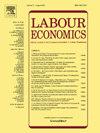平衡自动化的影响?任务重叠在求职中的作用
IF 2.6
2区 经济学
Q2 ECONOMICS
引用次数: 0
摘要
本文研究任务重叠是否可以平衡自动化对失业求职者的分配效应。利用语言模型,我们建立了一种新的job-to-job任务相似性度量方法。利用由此产生的工作网络来灵活定义就业市场,我们发现只有最相似的工作才会影响找工作。由于自动化暴露的工作与其他高度暴露的工作重叠,基于任务的重新分配对受影响的求职者来说并没有什么帮助。我们表明,对于最近的软件曝光来说,情况并非如此,因为任务重叠降低了求职中的不平等。本文章由计算机程序翻译,如有差异,请以英文原文为准。
Equalising the effects of automation? The role of task overlap for job finding
This paper investigates whether task overlap can equalise the distributional effects of automation for unemployed job seekers displaced from routine jobs. Using a language model, we establish a novel job-to-job task similarity measure. Exploiting the resulting job network to define job markets flexibly, we find that only the most similar jobs affect job finding. Since automation-exposed jobs overlap with other highly exposed jobs, task-based reallocation provides little relief for affected job seekers. We show that this is not true for more recent software exposure, for which task overlap lowers the inequality in job finding.
求助全文
通过发布文献求助,成功后即可免费获取论文全文。
去求助
来源期刊

Labour Economics
ECONOMICS-
CiteScore
3.60
自引率
8.30%
发文量
142
期刊介绍:
Labour Economics is devoted to publishing research in the field of labour economics both on the microeconomic and on the macroeconomic level, in a balanced mix of theory, empirical testing and policy applications. It gives due recognition to analysis and explanation of institutional arrangements of national labour markets and the impact of these institutions on labour market outcomes.
 求助内容:
求助内容: 应助结果提醒方式:
应助结果提醒方式:


